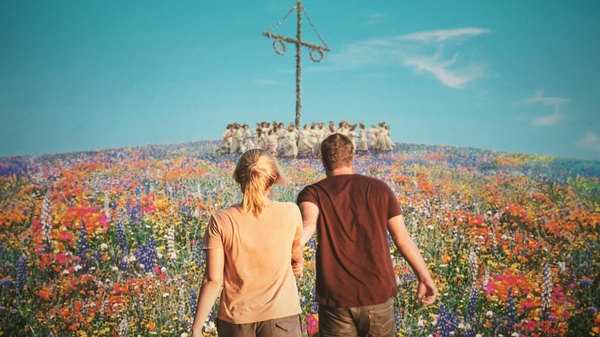The aspects of Midsommar that interest me the most actually have little to do with it being a horror film. Firstly, it is essential to point out the absolutely gorgeous location and cinematography in this film. If nothing else, it is beautiful. Particularly captivating are the subtle visual hallucinations Dani experiences as a result of the trippy mushroom tea she is served constantly throughout the movie. I would also commend Aster on his desire to create a horror movie where all the terrifying experiences of the characters happen in broad daylight. However, the best scenes and the most interesting subject matter in this film are actually a result of the more dramatic and dialog focused aspects, rather than the horror itself.

Specifically I would like to highlight the ways in which Dani and Christian’s toxic relationship is explored from both of their points of view, particularly in the first third of the film. He is initially presented as being extremely dismissive and unresponsive to her needs, however, we quickly realize that he feels smothered by her clinginess, and his friends encourage him numerous times to end their relationship, since it is also unhealthy for him. However, after the death of her family, he becomes trapped; she is unable to function on her own, and sees him as the only person she has left in the world. When she discovers his plans to go to Sweden without her, the single most tense scene of the film takes place.
In and all too real depiction of gaslighting and guilt-tripping, the conversation begins with Dani’s displeasure at finding out from Christian's friends at a party that he had been planning a trip to Sweden without telling her. By the end of the conversation, she is apologizing to him, seemingly confused about how the situation was twisted to place the blame on her. Simultaneously, she guilts him into promising her she can come along on the trip, leaving him the task of informing his unsupportive friends that his girlfriend will be crashing their boys’ trip. Except when she leaves the room, he promises them she won’t actually be coming, he just had to make her feel like she would. Next thing you know, they’re on the plane to Sweden, Dani included. Overall this entire exchange feels way to familiar. Dani is made to feel as if everything is her fault, and Christian feels like he can’t say no to her out of obligation. It’s a perfect recipe for resentment later down the line.
Where the movie goes from there does not feel quite as thematically rich to me as the handful of scenes surrounding their relationship before they even leave for Sweden. Whatever messages this movie is trying to convey about cult behavior, support systems, and grief become muddled in shocking imagery and the visual splendor of Hårga. While it is clear that Midsommar tries to use gore and sexuality to disturb the audience, these attempts fall flat. Overall, as many have said, Aster’s next move should really be to make a film that isn’t horror. With less focus put on scaring the audience, the complex nature of his characters’ relationships could be explored to a fuller extent.

No comments:
Post a Comment